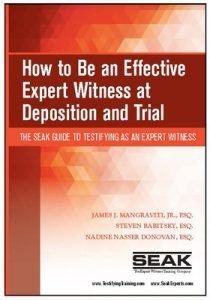How an Expert Witness Can Deal With Abusive Questioning at Deposition
[The following clip was excerpted from SEAK’s Streaming course, “Law for Experts: What You Need to Know to Succeed“]
Okay. So now let’s talk about this issue of abusive questions. Understand that attorneys are given wide latitude in the questions they may ask at deposition. And most questions, the vast majority are permissible. But there are certain occasions where the question crosses the line. So what do you do when the questions cross the line? And by that I mean they start to become personal attacks on you, cursing at you, getting physically in your face, inappropriate with the witness. The attorney is acting unprofessional and inappropriate consistently. So what do you do?
There is a provision in the federal rules. Most state rules also have a similar one. So I’ll show you Federal Rule of Civil Procedure 30(d)(3), Motion to Terminate or Limit the Deposition. So at any time during a deposition, the deponent, that’s you, the person being questioned, or a party, that’s the retaining counsel, right, may move to terminate or limit it on the ground that it’s being conducted in bad faith or in a manner that unreasonably annoys, embarrasses or oppresses the deponent or the party.
So the motion that may be filed in the court…if the objecting deponent or party so demands, the deposition must be suspended for the time necessary to obtain an order. There are some jurisdictions where you can actually halt the deposition and actually get a judge on the phone and deal with the problem. Not every deposition has judges available that way. So if you’re faced with a situation where you are getting those kinds of questions, that unreasonably annoy, embarrass, are oppressive or that the deposition’s in bad faith, you can file this motion.
So remember that before you file a motion like this, it’s like any other dispute, you have to first attempt to resolve the issue, that’s what the judge wants to see. And so what do you do? You warn counsel, “Look, counsel, if you’re gonna continue this behavior, this line of questioning, I am gonna exercise my rights under…” and then note, you know ahead of time know what the rule is, “I am gonna stop this deposition go to the judge.”
So you warn them, give them a chance to stop their behavior and if they don’t then and only then you can terminate…”I’m leaving the deposition. I’m gonna file a motion.” But when you do that understand two things. Number one, you have to follow through and actually file the motion. And number two, you do so at your peril. The judge may not agree with you that the situation was in bad faith, etc. And if the judge feels that you acted unreasonably by leaving, you may get sanctioned. So you have to proceed very carefully if you decide to take that road. Sometimes just letting counsel know that you know you have rights at the deposition is enough for them to back off.
[The foregoing clip was excerpted from SEAK’s Streaming course, “Law for Experts: What You Need to Know to Succeed“]

